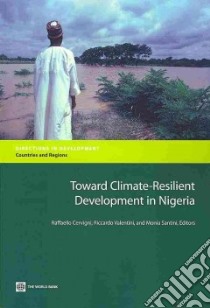Toward Climate-resilient Development in Nigeria - 9780821399231
Un libro in lingua di Cervigni Raffaello (EDT) Valentini Riccardo (EDT) Santini Monia (EDT) edito da World Bank, 2013
- € 26.40
- Il prezzo è variabile in funzione del cambio della valuta d’origine
If not addressed in time, climate change is expected to exacerbate Nigeria’s currentvulnerability to weather swings and limit its ability to achieve and sustain the objectivesof Vision 20:2020 [as defined in http://www.npc.gov.ng /home/doc.aspx?mCatID=68253].The likely impacts include:• A long-term reduction in crop yields of 20–30 percent• Declining productivity of livestock, with adverse consequences on livelihoods• Increase in food imports (up to 40 percent for rice long term)• Worsening prospects for food security, particularly in the north and the southwest• A long-term decline in GDP of up to 4.5 percentThe impacts may be worse if the economy diversifies away from agriculture more slowlythan Vision 20:2020 anticipates, or if there is too little irrigation to counter the effects ofrising temperatures on rain-fed yields. Equally important, investment decisions made on the basis of historical climate may bewrong: projects ignoring climate change might be either under- or over-designed, withlosses (in terms of excess capital costs or foregone revenues) of 20–40 percent of initialcapital in the case of irrigation or hydropower.Fortunately, there is a range of technological and management options that make sense,both to better handle current climate variability and to build resilience against a harsherclimate:• By 2020 sustainable land management practices applied to 1 million hectares can offsetmost of the expected shorter-term yield decline; gradual extension of these practices to50 percent of cropland, possibly combined with extra irrigation, can also counter-balancelonger-term climate change impacts.• Climate-smart planning and design of irrigation and hydropower can more than halvethe risks and related costs of making the wrong investment decision.The Federal Government could consider 10 short-term priority responses to buildresilience to both current climate variability and future change through actions toimprove climate governance across sectors, research and extension in agriculture,hydro-meteorological systems; integration of climate factors into the design of irrigationand hydropower projects, and mainstreaming climate concerns into priority programs,such as the Agriculture Transformation Agenda.
Informazioni bibliografiche
- Titolo del Libro in lingua: Toward Climate-resilient Development in Nigeria
- Lingua: English
- Autori : Cervigni Raffaello (EDT) Valentini Riccardo (EDT) Santini Monia (EDT)
- Editore: World Bank
- Collana: World Bank (Paperback)
- Data di Pubblicazione: 05 Agosto '13
- Genere: BUSINESS and ECONOMICS
- Argomenti : Sustainable development Nigeria Climatic changes Nigeria Climatic changes Economic aspects Nigeria
- Pagine: 188
- EAN-13: 9780821399231


